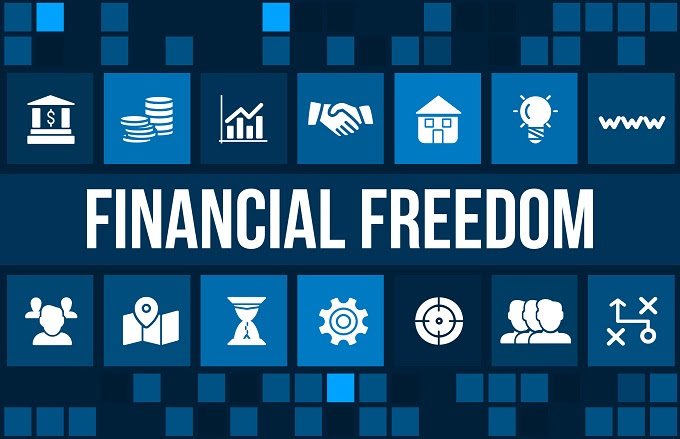10 Habits That Will Help You Reach Financial Freedom

The path to financial freedom isn’t a get-rich-quick strategy. And financial freedom doesn’t mean that you’re “free” of the responsibility of handling your money well. Quite the opposite. Having complete control over your finances is the fruit of hard work, sacrifice and time. And all of that effort is worth it!
Here’s how to begin your own journey to financial freedom!
1. Set Life Goals
What is financial freedom to you? A general desire for it is too vague a goal, so get specific. Write down how much you should have in your bank account, what the lifestyle entails, and at what age this should be achieved. The more specific your goals, the higher the likelihood of achieving them.
Next, count backward to your current age and establish financial mileposts at regular intervals. Write it all down neatly and put the goal sheet at the very beginning of your financial binder.
2. Make a Budget
Making a monthly household budget and sticking to it—is the best way to guarantee that all bills are paid and savings are on track. It’s also a regular routine that reinforces your goals and bolsters resolve against the temptation to splurge.
3. Pay Off Credit Cards in Full
Credit cards and similar high-interest consumer loans are toxic to wealth-building. Make it a point to pay off the full balance each month. Student loans, mortgages, and similar loans typically have much lower interest rates; paying them off is not an emergency. Paying on time is and will build a good credit rating.
4. Create Automatic Savings
Pay yourself first. Enroll in your employer’s retirement plan and make full use of any matching contribution benefit. It’s also wise to have an automatic withdrawal for an emergency fund, which can be tapped for unexpected expenses, and an automatic contribution to a brokerage account or something similar.
Ideally, the money should be pulled the same day you receive your paycheck, so it never even touches your hands, avoiding temptation entirely. However, keep in mind that the recommended amount to save is highly debated. In some cases the feasibility of such a fund can be a question.
5. Start Investing Now
Bad stock markets can make people question this but historically there has been no better way to grow your money than through investing. The magic of compound interest will help it increase exponentially over time, but you need a lot of time to achieve meaningful growth. Don’t try to be a stock picker or trick yourself into thinking you can be the next Warren Buffett. There can only be one.
Instead, open an online brokerage account that makes it easy for you to learn how to invest, create a manageable portfolio, and make weekly or monthly contributions to it automatically. We’ve ranked the best online brokers for beginner’s to help you get started.
Achieving financial freedom can be very difficult in the face of growing debt, cash emergencies, medical issues, and overspending, but it is possible with discipline and careful planning.
6. Watch Your Credit
Your credit score determines what interest rate you are offered when buying a new car or refinancing a home. It also impacts seemingly unrelated things, such as car insurance and life insurance premiums.
The reasoning is that someone with reckless financial habits is also likely to be reckless in other aspects of life, such as driving and drinking. This is why it’s important to get a credit report at regular intervals to make sure that there are no erroneous black marks ruining your good name.
7. Negotiate
Many Americans are hesitant to negotiate for goods and services, worrying that it makes them seem cheap. Overcome this cultural handicap and you could save thousands each year. Small businesses, in particular, tend to be open to negotiation, where buying in bulk or repeat business can open the door to good discounts.
8. Continuous Education
Review all applicable changes in the tax laws each year to ensure that all adjustments and deductions are maximized. Keep up with financial news and developments in the stock market and do not hesitate to adjust your investment portfolio accordingly. Knowledge is also the best defense against those who prey on unsophisticated investors to turn a quick buck.
9. Proper Maintenance
Taking good care of property makes everything from cars and lawnmowers to shoes and clothes last longer. As the cost of maintenance is a fraction of the cost of replacement, it’s an investment not to be missed.
Learn to know the difference between the things you want and the things you need.
10. Live Below Your Means
Mastering a frugal lifestyle by having a mindset of living life to the fullest with less is not so hard. Indeed, many wealthy individuals developed a habit of living below their means before rising to affluence.




